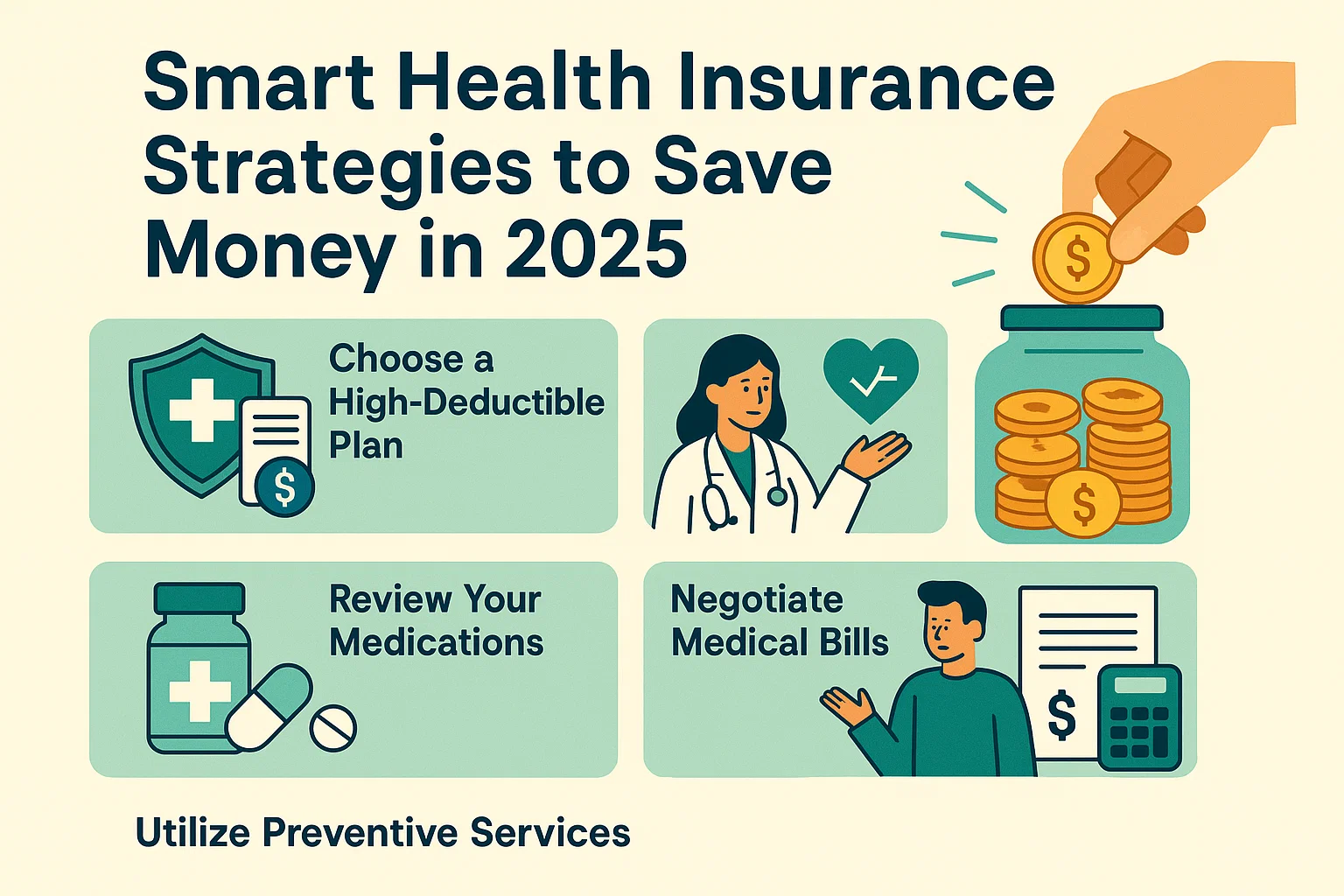Smart Health Insurance Strategies to Save Money in 2025

Smart Health Insurance Strategies to Save Money in 2025
Health insurance is one of the most critical financial tools you can invest in, yet it often becomes one of the most confusing. Rising medical costs, diverse plan options, and complex terms leave millions of people worldwide struggling to balance affordability with quality care. In 2025, as global healthcare continues to evolve, understanding the smartest ways to choose and use health insurance can help you save thousands of dollars while ensuring the protection you need.
Why Health Insurance Matters More Than Ever in 2025
With medical inflation rates averaging 6–9% annually worldwide, a single hospital visit can cost as much as several months of income. Health insurance protects you against financial ruin by covering major expenses, preventive care, and even long-term treatments. In countries like the US, UK, Canada, India, and Australia, insurers are introducing hybrid policies, telemedicine benefits, and global medical travel coverage. Understanding these options can save you both money and stress.
1. Compare Plans Thoroughly Before You Buy
One of the biggest mistakes consumers make is choosing the first plan offered by their employer or local provider. In reality, premiums, deductibles, copays, and coverage can differ widely across insurers. A family in the US, for example, can save $1,200–$3,000 per year simply by comparing options during the open enrollment period.
- Check if preventive care, annual checkups, and vaccinations are free.
- Understand the difference between HMO, PPO, and High Deductible Health Plans (HDHPs).
- Look for international coverage if you travel frequently.
2. Use High Deductible Health Plans with HSAs
High Deductible Health Plans (HDHPs) paired with Health Savings Accounts (HSAs) are one of the best money-saving tools. In 2025, contribution limits for HSAs have increased, allowing families to deposit up to $8,300 tax-free annually. These funds grow tax-free, can be invested, and are even usable for retirement after age 65.
Pro Tip: Even if you don’t hit your deductible, your HSA savings can grow like a retirement account while still being available for emergencies.
3. Take Advantage of Preventive Care Benefits
Most modern health insurance policies cover preventive services at no additional cost. Annual screenings, vaccinations, mammograms, cholesterol checks, and even mental health therapy are often included. By using these services, you can catch illnesses early and avoid massive hospital bills later.
4. Telemedicine and Virtual Care
Telehealth usage has exploded since 2020 and remains one of the cheapest ways to consult doctors. In 2025, many insurers now offer unlimited virtual consultations at zero or minimal cost. Instead of paying $150 for an in-person visit, telemedicine can save you up to 70% while still providing professional care.
5. Negotiate and Review Medical Bills
Few patients know this, but up to 80% of hospital bills contain errors. Always request an itemized bill and negotiate charges. Many insurance companies provide online tools for cost estimates, helping you avoid overpaying. In some countries, simply paying in cash or upfront can reduce medical bills by 10–30%.
6. Use Wellness Programs Offered by Insurers
Insurance companies are incentivizing healthy behavior by offering discounts, cashback, or reduced premiums if you meet fitness goals, attend preventive checkups, or quit smoking. Some even provide free wearable devices to track your progress.
7. International Coverage & Medical Tourism
Did you know that certain procedures abroad cost a fraction of what they do in developed countries? Health tourism is booming in 2025, with destinations like Thailand, India, and Turkey offering world-class care at 50–70% lower costs. Many insurers now cover international treatments if performed at accredited hospitals.
8. Tax Benefits and Deductions
Health insurance isn’t just about protection—it can also lower your tax bill. In countries like the US, premiums paid for HSAs and long-term care insurance are tax-deductible. In India, Section 80D of the Income Tax Act allows deductions up to ₹75,000 annually for family coverage. Always check your country’s tax laws for health-related savings opportunities.
9. Employer-Sponsored vs Private Insurance
If your employer offers health insurance, compare it with private market options. Sometimes private plans offer broader networks, better global coverage, and lower out-of-pocket costs. Don’t assume employer insurance is always the cheapest—shop around during open enrollment.
10. Save with Family & Group Policies
Instead of buying individual policies, consider family floater or group health insurance plans. Group plans often cost 20–40% less than individual coverage while offering comprehensive protection. Some credit cards and professional associations even include group health benefits as perks.
11. Focus on Lifestyle to Cut Long-Term Costs
While insurance protects you financially, your lifestyle choices ultimately decide your health costs. Regular exercise, balanced nutrition, quitting smoking, and stress management can cut your healthcare expenses drastically over decades. Insurers are increasingly rewarding such healthy behaviors with lower premiums.
12. Top Countries with Affordable Health Insurance in 2025
- Germany: Public-private hybrid system ensures affordable care.
- Singapore: Mandatory health savings make coverage accessible.
- India: Low-cost premiums with wide global acceptance.
- Thailand: Excellent private hospital network for medical tourism.
- USA: Best options for tax-saving HSAs and telehealth benefits.
Conclusion
Health insurance in 2025 is not just about choosing the cheapest plan—it’s about choosing wisely. By leveraging preventive care, HSAs, telemedicine, tax benefits, and global coverage, you can significantly reduce costs while ensuring financial safety. Always compare, always negotiate, and always use your benefits to the fullest.
Remember: The smartest investment in your health is not just buying insurance—it’s using it effectively to save money and live a longer, healthier life.
Comments (3)